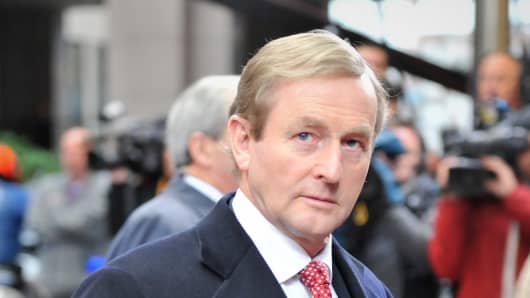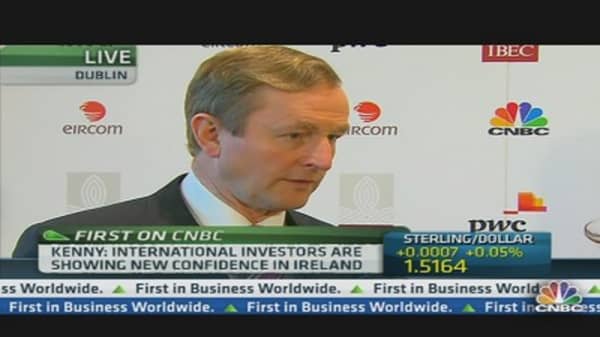He said his country was a "demonstration" of a country with self-belief and of people working with government to follow a strategy to restore prosperity and order in public finances.
Ireland received a 67.5 billion euro ($88.5 billion) bailout program approved by the "troika" of the European Union, European Commission and International Monetary Fund (IMF) in November 2010.
Ireland has said it hopes to exit the program by the end of the year and to regain access to debt markets, a recovery that Kenny said had been "very challenging."
"The situation in Ireland can be a model for others to follow, but it is very challenging both for people and for government to exit a bailout program," he said. "It has been an enormous challenge to our people and yet, being pragmatic, these problems need to be sorted out and they can only be sorted out with strong, political decisions, made in the people's interest," he added..
Since implementing widespread measures to reduce its budget deficit, the country has been seen as a "poster child" for the euro zone's austerity mandate, commended by the IMF for its attempts to cut its budget deficit and experiencing a recovery in economic growth.
Billions of euros worth of tax hikes and spending cuts have allowed Ireland to regain credibility in the euro zone and in early February the European Central Bank agreed a deal with Ireland to ease its debt repayments incurred after it rescued Anglo Irish bank, a victim of the country's housing bust that precipitated its economic crisis.
(Read More: Ireland Poised to Become Europe's Winner')
Despite being the second country, after Greece, to request financial assistance from the troika, Ireland has not had a writedown of its private-sector debts or a two-year bailout extension to bailout terms as Greece was given.
Ireland and Portugal have objected to what they see as "unfair" treatment and have also asked for more time to repay bailout loans.
"It would be another step in the right direction were that to be approved. Ireland had to borrow 64 billion (euros) and the tools available now, were not available then. We consider that the level on our people was unfair," he said.
He urged speed over enacting the European Union's banking union, in order to break the "vicious circle" between sovereign and bank debt, saying there was no time to waste and he was "frustrated" by delays.
Ireland's gross domestic product grew by 0.9 percent in 2011 and various forecasts expects to see the strongest growth in the euro zone in 2013,with up to 1 to 1.2 percent growth forecast by Ireland's Economic and Social Research Institute (ESRI).
Ireland's unemployment rate stood at 14.6 percent in January 2013, according to the country's Central Statistics Office, but has decreased from a 15 percent high a year ago.
Kenny said that unemployment was "far too high" in his country and welcomes the European Commission's decision to put six billion euros towards tackling youth unemployment of 30 percent in Ireland.
"This can only be dealt with by strong, clear and decisive political action," he said.
Despite Kenny's words of warnings, business leaders at the conference of the Irish Business and Employers' Confederation told CNBC that they were confident that Ireland would continue to improve, saying there was a strong business story in the country from foreign direct investment and indigenous multi-nationals.
(Read More: Ireland's Celtic Tiger Rising From the Ashes)




